Part 1: The importance of Happy Caregivers
Part 1: The importance of happy caregivers

-jpg.jpeg?width=250&name=CTAS%20(2)-jpg.jpeg)
Unfortunately, there are some of you reading this page who view caregivers as a necessary evil or just a means to an end. With apologies for the cliché, your attitude towards caregivers will determine the altitude of your home care agency.
In a top agency, caregivers are beloved by their clients and the stories of the joy that they bring ring throughout the communities that you serve. This keeps your phone ringing with referrals and lowers your costs for advertising and recruiting.
Many of the agency owners who are reading this started out as care providers and came into the industry because of the joy that they provided and the corresponding satisfaction that they experienced by providing that service. But becoming a business owner is tough and you may have lost some of that joy along the way. Every one of you have stories like the one shared below, but please take the time to listen to Nancy’s story about her mom’s caregivers. At Ankota we talk constantly about the Heroes of Homecare, but Nancy goes farther and says that her mom’s caregivers are angels.
Also remember that the cost to replace a caregiver by most industry references is over $2,500.
Part 2: Why is it hard to retain caregivers?
The good news is that the demand for caregivers is increasing rapidly. This results from the medical breakthroughs that have increased life expectancy and the large “baby boomer” population reaching the age where they’ll need home care. A great book for entrepreneurs today is The Longevity Economy that looks at how important the elderly will be in the economy over the coming 30+ years.
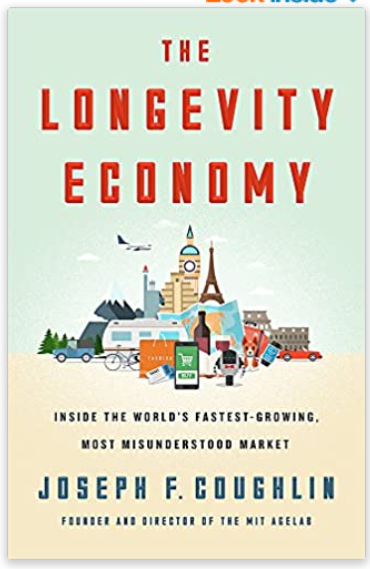
The bad news is that the competition for caregivers is intense! So, your job is to make caregivers want to work for your agency. The care that your caregivers provide is your company’s “product.” The more product you have the more you can grow. But caregivers are people and they don’t want to be treated like a commodity. They want to be well prepared for their assignments, to feel that they’re part of a team, to be recognized for their contributions, to have a support system, and to have a career path.
Here's a rundown of why caregivers leave:
- No Shifts: The primary reason that caregivers leave is because they're not getting shifts. If their client passes away or moves into a nursing home, they need work and if you can't provide it, the agency across town can.
- Folks quit their supervisor: This Forbes article explains that "People don't leave companies, they leave managers. People don't quit their jobs, they quit their bosses."
- New Caregivers, despite your orientation efforts, don't feel prepared for their assignments: With the "battle for caregivers" it is likely that you'll be hiring young people for whom this is their first job. There's a lot to being a caregiver and despite your nice orientation new caregivers need supportive supervision and coaching on their first assignments.
- Feeling of Isolation / Lack of Communication: In many agencies, the mindset is "I got the client and I matched a caregiver, so I'm done." This is a losing strategy! Many caregivers never hear from their office or their supervisors. In addition to the caregiver feeling isolated, the client feels that they get no support from your agency (only bills) and makes them vulnerable to shopping the competition.
- No recognition: It's not enough just to be in touch with caregivers. If they receive no recognition for their work and their friends working for competitors are, then why should they stay?
- Pay: This is a double edge sword where both underpayment and overpayment are problematic for your agency, but agencies who provide raises as caregivers receive more training and experience will win out over yours if you don't. Also, some agencies expect their caregivers to pay for their own training whereas others pay for the training and compensate the caregivers for taking the training. Which agency would you rather work for?
- No Career Path: The best agencies nurture their caregivers. They can learn specialized skills like memory care or palliative care and earn more. They can be promoted to part time or full time mentorship and supervision. They can go on to work in the office doing scheduling or sales. What career path do you offer?
Want to Learn more? Here's a strong article and video on "Why Caregivers Leave" from Steve "the Hurricane" Weiss.
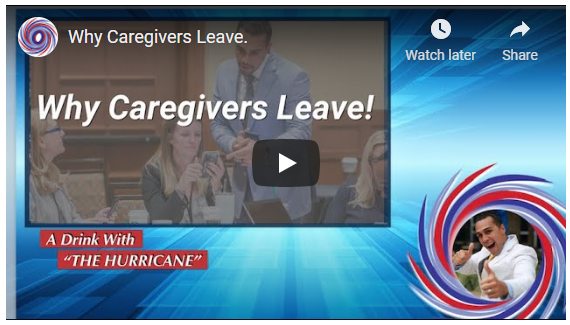
Part 3: Best Practices for Caregiver Recruiting and Retention
This section offers practical solutions for caregiver recruiting and retention. Each area will be in its own "chapter" below. It is likely that your agency is great at some things on the list and not so good in others. The key to successful improvement is to prioritize and to show continuous improvement. This is called the "agile" approach to project management. Here's a link to a podcast about the agile approach.
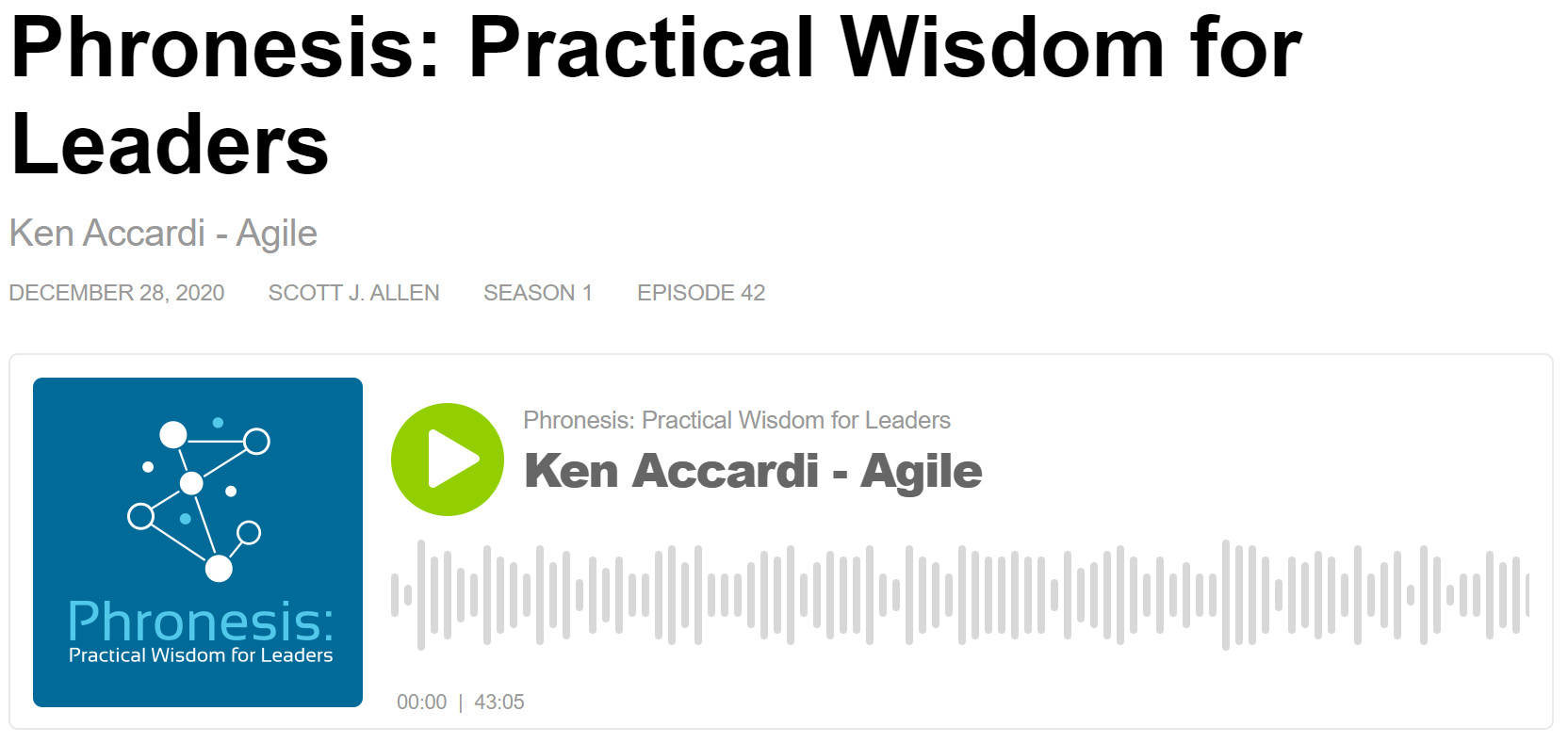
Caregiver candidates understand the concept of "shifts"
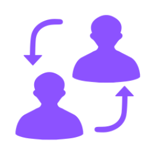
When thinking about entry level caregivers, the other jobs that they're considering are likely to be in retail or in a restaurant and those jobs offer "shifts." Be sure to use this language when advertising and recruiting caregivers.
Related to this, one of our trusted advisors Steve "the Hurricane" Weiss, advises home care agencies to only take clients who need 20 or more hours per week, for a number of strong reasons:
- if the client is asking for a few hours a week, they aren't really at the stage where they need serious care. Steve offers the analogy that when he and his wife go out on a date they need a babysitter, but when their kids were 3 and he and his wife both worked, they needed day care. Steve's advice is that if a client needs 4 or 6 hours a week that something like care.com might be a better fit. You can help them in a different way. For example, for $100 a month you can have one of your supervisors check in on a potential client every two weeks to see if their needs are escalating.
- Also, caregivers need to make a living and if you're offering them fewer than 20 hours they can't do it with your agency, so they're more likely to leave.
- A "math trick" you can think about is the 30 by 30 rule. If you can get 30 clients averaging 30 hours per week, your agency will be making over $1M per year.
Caregiver Job Descriptions need to convey a sense of purpose

-jpg.jpeg?width=250&name=CTAS%20(3)-jpg.jpeg)
If you watch sports, you may have noticed that the when the most beloved athletes are interviewed after a great game, they always thank and give credit to their supportive fans.
Applying this to caregivers, be careful to make the job description about "them" and not about you. If your ad leads with "Make a difference in someone's life," it's going to attract more attention than "Loving Home Care has been serving the community for 25 years."
Here are some best practices for caregiver job descriptions:
- Write a simple job title based on what candidates will search for. Strong examples are "Caregiver for home care" or "Caregiver to help elderly seniors"
- Convey a sense of purpose
- Emphasize being a member of a team
- Make your ad easy to "scan" with a great title and key bullets up top
- Tell your story in the "middle" like "We starting Loving Home Care after taking care of our own aging parents." We're looking for special caregivers who will care for their elderly clients as if they're family"
- Provide a concise summary of the job. Start from something like the following: "As a caregiver at Loving Home Care, you will improve the quality of life of elderly seniors in need. You will help them enjoy their daily routine while helping with tasks like preparing meals, providing companionship, encouraging exercise, and helping with homemaking. You will provide encouragement and love while earning and growing.
- Talk about some of the nice things that a caregiving job can offer, like flexibility in shift times, education, advancement, recognition and rewards, minimal travel and paid reimbursements for time off and travel. Of course all of these are subject to what you offer.
- As it gets harder to recruit caregivers with experience and previous training, make sure to talk about the type of person your searching for. Again, use this to appeal to their heart. Some ideas are compassion, loyalty, integrity, desire to make a difference
- Point out that you will train on job skills but that ability to cook, do light cleaning and caring experience are a plus.
- Make sure that there's a clear "Call to Action" like "Apply now" with all of the details on how to apply.
Managing the Recruiting Process

In addition to having a great job description, there's a lot more to the recruiting process. Here are a few tips to get you started:
- Your best recruiting source is referrals from your caregivers
- The top sites for recruiting caregivers are Indeed.com and ZipRecruiter, but there are also some strong industry specific sites like MyCNAJobs.com and CareListings.Com
- Speed is crucial. Here are some targets:
- Reply to prospects the same day that they apply
- Try to meet them for a first interview on Zoom that same day or the next day
- Target to make offers within 5 business days
- Interview for both aptitude and attitude. The most important questions are the ones that determine if the candidates attitude and energy are aligned with your core values.
In researching this page, I discovered an impressive recruiting guide from Home Care Pulse.
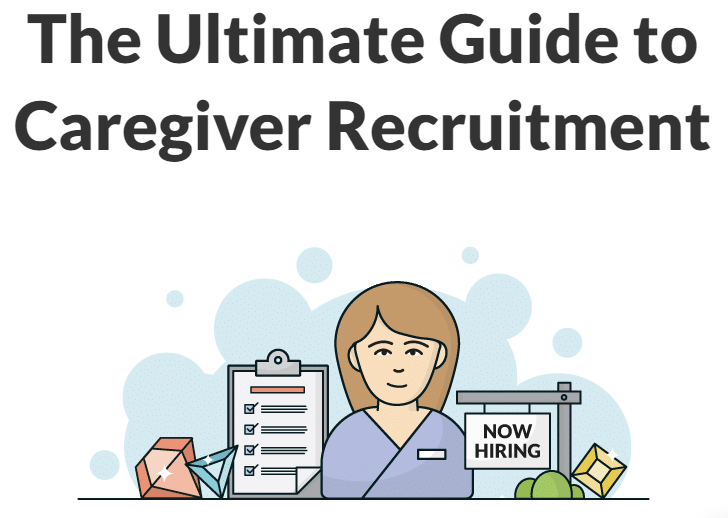
Create a Supportive Culture

-jpg.jpeg?width=250&name=CTAS%20(4)-jpg.jpeg) Caregiving does not provide the "office environment" where caregivers can make friends and get support, but some agencies do an exceptional job creating a collaborative culture. Here are ideas of ways that you can create a culture of teamwork in your agency.
Caregiving does not provide the "office environment" where caregivers can make friends and get support, but some agencies do an exceptional job creating a collaborative culture. Here are ideas of ways that you can create a culture of teamwork in your agency.
- Have mentors visit their caregivers at least once every two weeks. Note that if this is not possible (due to Covid) you can have a secure video calls.
- Hold short monthly caregiver meetings (e.g., on Zoom)
- Recognize all birthdays of caregivers and clients
- Recognize team members at their 6 month anniversary and every year anniversary
- Provide rewards for positive client feedback and solid performance. These can be small gift cards.
- Think of unique ways to recognize caregivers. One of our consultant friends, Ginny Kenyon, asked what caregivers would want as a way of being recognized and they asked for business cards. This gave the caregivers a source of pride and they would give out the cards in the grocery store, leading to new customers. Another successful home care leader, Karl Pierre, provides books to his caregivers such as "The Lean Startup" and "Crucial Conversations." Both of these books are targeted towards developing leaders, and send the message that top management recognizes them as talent that they want to nurture.
- Send birthday cards
- Appoint a "caregiver advocate" who caregivers can reach out to for job and personal advice
- Hold caregiver parties (maybe on Zoom for now).
Offer Training and Pay your Caregivers to Attend

The top agencies offer a strong training program. In addition they pay their caregivers for attending classes, and they give raises to caregivers as they complete the higher level classes.
The best classes have a combination of "lecture-style" training from experts either live or online (necessity due to COVID but also more convenient and asynchronous for the caregivers), quizzes, skills demonstrations, discussion and hands on portions.
Completed training should be recognized with certificates and graduation ceremonies.
Here's an outline for a rich curriculum:
- Basic Training:
- Culture / Vision / Values / Professional Standards What they are allowed and not allowed to
- Safety/Osha guidelines.
- Body systems and Emergency preparedness: First Aid, CPR
- Bathing/Hygiene
- Cooking and cleaning
- Infection prevention (brought into basic training due to COVID)
- Advanced Caregiving Skills
- The effects of aging on anatomy and body systems
- Chronic conditions
- Alzheimers / Dementia
- Parkinsons
- Stroke
- Heart Attack
- Cancer
- Fall prevention and mobility support
- Nutrition / Hydration / Meal Preparation
- Transfers and Assistive Devices
-
- Dementia and Behavioral Care Deep Dive
- Alzheimers and other forms of dementia
- Team building and care support circles
- Impacts on ADL Care
- End of Life Care / Grief and Loss Support
- Caregiver Wellness and Advancement:
- Personal development
- Self Care
- Mentorship
- Overall agency Operations (Recruiting, onboarding, scheduling)
Your Agency Management Software should encourage caregiver retention
An important aspect of caregiver retention is providing the tools that make their jobs easy. Accurate timekeeping is essential and Electronic Visit Verification (EVV) is that law, but if those systems don't work it results in frustrations for both supervisory personnel who need to back things up with paper time sheets.
Here are some of the ways that your home care software can help you retain caregivers: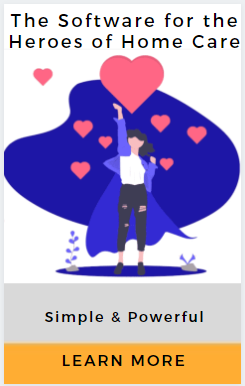
- Simple to use:
- Schedules are known (no need to type client codes)
- Clock-in and clock-out are flawless and always acquire an accurate location.
- The app works offline in the event that coverage is lost.
- It's simple to sign-in, offering fingerprint or Face-ID in addition to username and password.
- Notifications:
- Newly assigned or changed shifts
- Available shifts for fill-in work
- Training and documentation deadlines are shared
- Calendar is visible
- Caregiver can set their availability
- Simple communications with the office via secure text and HIPAA compliant video chat
- Caregivers stay in touch with the office:
- Receive newsletters including recognition of their accomplishments and those of their peers
- Stay apprised of company events and training opportunities
- Get help
- Escalate client concerns
- Office can track recruiting prospects
Providing a Career Path
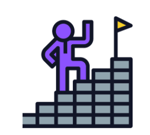
-jpg.jpeg?width=188&name=CTAS%20(5)-jpg.jpeg)
The last topic in this ultimate guide is the importance of providing a career path. Here are some thoughts on how to create a career path within your agency:
- New caregiver
- Advanced Caregiver: (trained on specialty services like memory care, Certified Nursing Assistant (CNA) skills, or end of life care)
- Caregiver / Mentor
- Caregiver Supervisor
- Office staff (scheduler, recruiter, marketer or more)
Offers and Opportunities to Learn More
Here are more articles and offers to help you on your journey as an expert at caregiver recruiting and retention.
- Millionaire's Bootcamp: This special edition of the Steve the Hurricane boot camp is only for million-dollar-plus agencies looking to grow. Ankota follows get a $100 Discount using the code ANK100. Click on the image below to claim your discount.

- Momentum: This is a caregiver recruiting and retention program offered by Hurricane Marketing Enterprises (the marketing arm of "Steve the Hurricane"). The program consists of both online education modules and live classes and includes a certification. The course is taught by both Steve "the hurricane" Weiss and Anne-Lise Gere from Gere Consulting Associates - masters in home care human resource management.
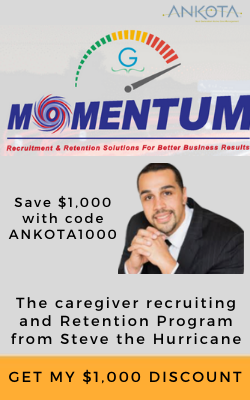
- Care Listings gives you a free listing page for your home care agency to be found by caregivers and prospective clients. You can add or "claim" your listing for free. They also have premium services (for a fee) that give you preferred placement of your listing and give you access to caregiver candidates in your area.
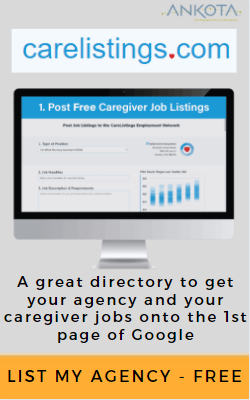

-jpg.jpeg?width=250&name=CTAS%20(2)-jpg.jpeg)


-jpg.jpeg?width=250&name=CTAS%20(3)-jpg.jpeg)


-jpg.jpeg?width=250&name=CTAS%20(4)-jpg.jpeg) Caregiving does not provide the "office environment" where caregivers can make friends and get support, but some agencies do an exceptional job creating a collaborative culture. Here are ideas of ways that you can create a culture of teamwork in your agency.
Caregiving does not provide the "office environment" where caregivers can make friends and get support, but some agencies do an exceptional job creating a collaborative culture. Here are ideas of ways that you can create a culture of teamwork in your agency.
